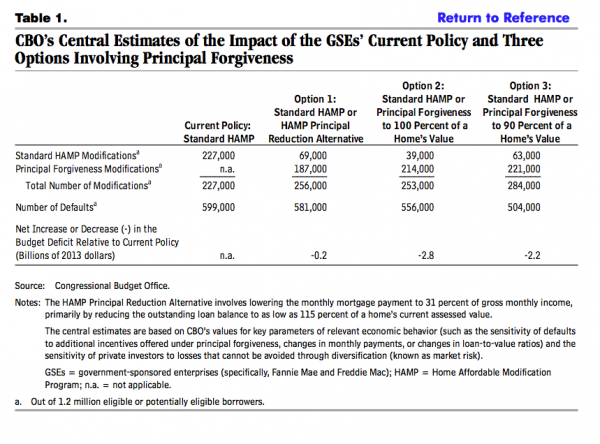
Mortgage Principal Reduction Could Save Taxpayers $2.8 Billion
By Gretchen Wegrich Updated on 6/3/2013An investigation into the potential costs of a widespread mortgage princiapl reduction program discovered that taxpayers would benefit to the tune of $2.8 billion. The report, issued by the Congressional Budget Office, examined several scenarios and reported how different actions would affect taxpayers' bottom line.
Principal: 1. The amount borrowed (such as the face value of a debt security), or the part of the amount borrowed which remains unpaid (excluding interest), here also called principal. 2. The part of a monthly payment that reduces the outstanding balance of a mortgage. 3. The original investment.
The investigation was instigated by Rep. Elijah E. Cummings, a member of the House Committee on Oversight and Government Reform, when Cummings requested that congress should consider reducing principal for underwater mortgages backed by Fannie Mae and Freddie Mac.
"Today’s report demonstrates that principal reduction programs are a win-win-win for our country — helping U.S. taxpayers, American homeowners and our nation’s economy all at the same time," said Cummings in a statement.
He added, "Rather than implement these programs years ago when their benefits were obvious, ideologues ignored this evidence and harmed our nation as a result. I hope this report provides a new opportunity to anchor our nation’s housing policy in facts rather than partisan politics."
Programs that reduced the principal --or amount borrowers owed on an underwater home --could reduce borrower defaults and provide a slight boost to economic growth, the Congressional Budget Office (CBO) discovered.
The CBO considered scenarios that would bring homeowners to 115 percent, 100 percent and 90 percent loan-to-value ratios, calculating that as many as 95,000 homes could benefit from such a program.
mortgage amount
Loan-to-value ratio = ---------------------------
appraised value of the property
Principal reduction programs are opposed by Ed DeMarco, the current acting director of the Federal Housing Finance Agency. However, the announcement of President Obama's pick of Rep. Mel Watt, D-North Carolina, to replace DeMarco at the FHFA would precede a potential overhaul of FHFA programs and regulatory oversight.
However, those in opposition to principal forgiveness say that the primary issue is the moral hazard of loan forgiveness. If taxpayers indeed pay to reduce loan balances for underwater homeowners, the door is open for homeowners to then sell their properties at a profit and pocket the proceeds.
"The most effective approach would be to offer principal forgiveness only to borrowers who were delinquent at the time the program was announced, thereby excluding borrowers who become delinquent in order to receive principal forgiveness," the report states.
"Another approach would be to forgive a portion of the borrower’s loan in exchange for granting the lender a claim on future equity or home appreciation — that approach is known as a 'shared appreciation' modification."
Under one example included in the report, the lender could retain the right to 25% of any future increase in the home's value.
Findings appear in the image below:


Didn't find the answer you wanted? Ask one of your own.
-
 What You Need To Know About Escrow
View More
What You Need To Know About Escrow
View More
-
 President Obama Initiates Lower FHA Mortgage Insurance Premiums
View More
President Obama Initiates Lower FHA Mortgage Insurance Premiums
View More
-
 What is Quantitative Easing?
View More
What is Quantitative Easing?
View More
-
 The 5 New Mortgage and Housing Trends for Summer 2013
View More
The 5 New Mortgage and Housing Trends for Summer 2013
View More
-
 Fannie Mae profitability skyrockets
View More
Fannie Mae profitability skyrockets
View More
-
 Foreclosure protections for more soldiers after lawmakers draft bill
View More
Foreclosure protections for more soldiers after lawmakers draft bill
View More
-
 FHFA: HARP success follows low mortgage rates, February refinance volume strong
View More
FHFA: HARP success follows low mortgage rates, February refinance volume strong
View More
-
 Use of Mortgage Interest Deduction Depends on Where You Live
View More
Use of Mortgage Interest Deduction Depends on Where You Live
View More
-
 HUD will sell 40,000 distressed loans in 2013
View More
HUD will sell 40,000 distressed loans in 2013
View More
-
 Mortgage Applications Regain Traction after Sluggishness, Rates Continue to Fall
View More
Mortgage Applications Regain Traction after Sluggishness, Rates Continue to Fall
View More
-
 HARP 3.0 Discussions Reveal Little Hope for HARP Update
View More
HARP 3.0 Discussions Reveal Little Hope for HARP Update
View More
-
 Home Prices Rise in February According to LPS Data
View More
Home Prices Rise in February According to LPS Data
View More
-
 Balancing Act: House Committee Hears Opposing Viewpoints Over Mortgage Interest Rate Deduction
View More
Balancing Act: House Committee Hears Opposing Viewpoints Over Mortgage Interest Rate Deduction
View More
-
 Near Record Low Mortgage Rates Buoy Housing Recovery
View More
Near Record Low Mortgage Rates Buoy Housing Recovery
View More
-
 The Credit Block
View More
The Credit Block
View More
Related Articles
Ask our community a question.
Searching Today's Rates...

Featured Lenders
Joseph Klein
Mortgage Store Commercial
Scottsdale, AZ
Joe McAllister
Meridian Zone Financial
Bismarck, ND
Kat Whitman
Whitman Met, Inc.
Sacramento, CA
Daniel Walsh
Peoples Bank
Cincinnati, OH

